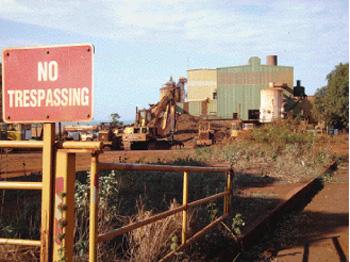KAUMAKANI — The final chapter of Kaua‘i’s epic plantation era has been written and the century-old story will draw to a close in the coming weeks. “Life goes on,” said Larry Lastimosa, one of the 137 Gay & Robinson employees
KAUMAKANI — The final chapter of Kaua‘i’s epic plantation era has been written and the century-old story will draw to a close in the coming weeks.
“Life goes on,” said Larry Lastimosa, one of the 137 Gay & Robinson employees who recently received notice that the sugar mill will harvest its last crop in late October.
Even though Lastimosa and co-worker Gordon Jacinto have uncertain futures, with families to care for and “grim” job prospects, they still had warm smiles on their faces Saturday morning and seemingly upbeat dispositions.
They are among the 320 families, consisting of employees and retirees, who will continue to live in company-owned housing on the Westside.
Only around 30 employees will be left to work at Gay & Robinson after next month in order to carry on various jobs, such as administrative positions and maintaining the Gay & Robinson Ranch operation which is not affected by the shut down.
“I’m extremely saddened,” Gay & Robinson President E. Alan Kennett said in an interview Saturday at Kaumakani when asked how he felt about the closure of the business which opened in 1892.
Gay & Robinson workers like being outside and working in the fields, he said. “To ask these employees to work in the service industry is extremely hard.”
Nonetheless, it was evident that “mounting debt” and high operation costs meant the operation — which once produced 1 million tons of sugar at its height — could no longer be sustained, he said.
At one point, Gay & Robinson had looked into the production of ethanol. But when the “collapse in price” of oil occurred in mid 2008, entities originally slated to be a part of the endeavor backed out, Kennett said.
“I fought really hard to keep it going … it really has been a tough time,” he said.
The news is “truly heart-wrenching,” said George Costa, Office of Economic Development director, Friday.
“I’m sure I represent the sentiment of others who have been raised on Kaua‘i and are used to seeing acres of sugar cane and the relationships with family and friends that were part of the sugar industry for decades,” he wrote in an e-mail. “We felt a loss when the pineapple canneries closed, and then the emphasis shifted to sugar and a fledgling visitor industry. Now as sugar becomes a fond memory, we have a mature visitor industry that is facing similar economic challenges.”
Kaua‘i Visitors Bureau Executive Director Sue Kanoho said that even from a tourism industry standpoint, it is her hope that the 7,500 acres of agricultural land used to grow the sugar cane will be kept in tact.
“Kaua‘i is a small rural island and that’s the charm of why people come here,” she said Friday. “Keeping the land for agriculture is beneficial to Kaua‘i and to the world.”
Kennett agreed that the land should continue to be used for agriculture, especially since the sugar mill is the only one still in operation on the island.
“It’s vitally important to keep the Westside green,” Kennett said. “It’s our ultimate goal.”
Some 3,400 acres of land has already been leased to Dow AgroSciences for corn crop and further development of hydroelectric generation. In addition, Pacific West Energy is looking to continue growing sugar cane and “woody biomass” on the additional land for production of energy and ethanol.
Sugar cane is an “attractive, multi-purpose crop,” said Pacific West Energy President William Maloney, Saturday.
The “fast track plan” would be to have all the business transactions “buttoned up” in 60 days and to have construction begin in approximately six months, he said.
With federal legislation providing funding for renewable energy sources such as biomass, Kaua‘i Island Utility Cooperative President and CEO Randy Hee said the incentives are appealing.
Personally having “deep roots in sugar,” Hee said he “hates to see” the industry go, but is hopeful in working with Pacific West Energy on a plan to harvest crops for energy production.
“Perhaps with our energy plan, we can get the mill going again … we see a lot of potential,” he said Friday.
If everything goes accordingly, all former Gay & Robinson employees could potentially be re-hired with the new Pacific West Energy operation, Maloney said, adding that this would create additional job opportunities for others too.
He said they are looking to acquire a total of 15,000 acres of agricultural land on Kaua‘i.
“Agriculture is one of the bases of the economy,” Kennett said.
Shipping “all our agricultural jobs overseas” and not being able to “feed ourselves here would be a travesty,” he said.
Though there are some who might be glad to see the industry fade away, Kennett said, “all you’ve done is moved the operation to another country” like Brazil where environmental standards are not as high and labor laws are not as stringent.
Kennett plans to stay on island at least as long as it takes to oversee the transition, he said, as there is still so much to be worked out.
After October, Hawaiian Commercial & Sugar Company on Maui, a division of Alexander & Baldwin, will be the only sugar cane operation in existence across the state.


